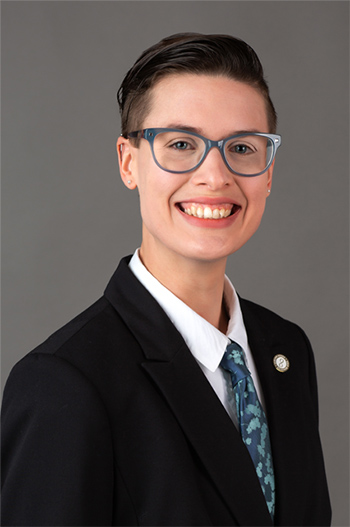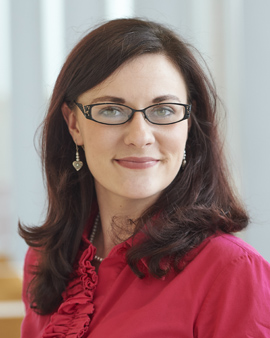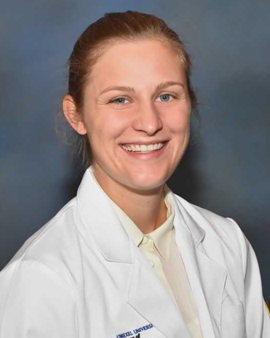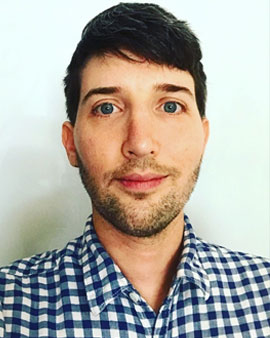LGBTQ+ Health Symposium Shares Best Practices for Providing Care
July 12, 2021
By Lisa Ryan
On Wednesday, June 30, College of Medicine community members came together to learn best practices for providing health care to LGBTQ+ patients during a virtual event organized by the College of Medicine and Tower Health.
With presenters from across the country, the all-day LGBTQ+ Health Symposium covered a variety of topics, from the basics of sexuality, gender identity and expression, to eating disorders in the LGBTQ+ community.
“I definitely wanted the symposium to address physician competence and preventive medicine for LGBTQ+ communities,” said Maryssa Lyons, a PGY-1 psychiatry resident at Tower Health – Brandywine Hospital and one of the lead organizers of the symposium. “I also wanted it to cover stigmatization, especially around transgender people, among physicians and medical students.”

As such, Lyons and student organizers from the College of Medicine’s LGBTQ Professionals in Medicine (LGBTQ-PM) group chose Katelyn Regan, LSW, MEd, as the day’s first presenter.
“They gave us a list of several things they were comfortable speaking on, and we ended up choosing their experience with narrative medicine in providing agency in medicine, and a little bit about gatekeeping,” said Alexa Profozich, an MD program student and LGBTQ-PM member. “Once we had a preliminary Zoom meeting with them, we realized they would be a really great person to also give an introductory presentation on terminology.”
Regan is a clinical social worker serving gender variant, gender expansive, and transgender youth and their families at the Children’s Hospital of Philadelphia’s Gender and Sexuality Development Clinic. Regan drew on their work in medicine and their studies as a doctoral candidate researching nonbinary and genderqueer patients’ health care experiences during their presentation.

Maryssa Lyons, MD
Regan began their talk by defining and differentiating biological sex (the physical composition of one’s body), gender identity (how one feels inside), gender expression (how one presents to others) and sexual orientation (who someone interacts with sexually or romantically). Each is a separate layer of one’s self, and each component and the relationships between those component parts can be described with a wide variety of labels.
“The beauty and complexity of having so many labels are that it allows us to try to articulate our lived experience a little bit better,” Regan said. “I learn new terms and words almost daily; we need to educate ourselves as providers, but if we’re caught off guard one day by a term we don’t recognize, the first thing is to thank the person for having the courage to share that with us. Then we can ask, ‘What does that term mean to you?’ because a lot of these can mean different things to different people.”
Regan outlined practices they use to help patients of all identities and backgrounds feel safe, and covered the role of medical providers in gender affirming care. They said that many providers want to move away from old models that pathologized queerness and gender diversity, and assumed that physicians knew patients’ identities and needs better than the patient themselves did.

Katelyn Regan, LSW, MEd
“All of you as medical professionals will have to ask yourselves, ‘Who am I to my patients? How can I best support my patients’ goals in care?’ Your role in best care is to be able to always use professional language, while not using any disparaging terms or phrases or making jokes about gender identity or expression, and challenging colleagues if they are being transphobic. Ideal care starts and ends with all of you as medical providers,” said Regan.
Following Regan’s presentation, event attendees learned about more general topics, like preventive care, as well as more specialized topics, including eating disorders in the LGBTQ+ community and pelvic floor physical therapy following gender-affirming surgeries.
Creating a feeling of safety for LGBTQ+ people, especially transgender and gender-diverse people, in health care environments was a common thread for presenters and event organizers. Both Lyons and Profozich brought personal experience to the table, as members of the LGBTQ+ community and as health care providers, in planning the symposium.
“Through my experience and those of my friends’, I’ve seen the mental health tolls homophobia and transphobia take on people in inhospitable environments,” Lyons said. “It is incredibly detrimental to mental health.”

Alexa Profozich
Assisting physicians in an emergency room in Ohio prior to enrolling at the College of Medicine, Profozich was working on a night when a transgender patient was admitted to the ER.
“The whole staff was whispering, letting everyone know there was a transgender patient in the emergency department,” they said. “They knew I was gay, so they said, ‘Alexa, why don’t you go with the doctor to see the patient, so that way they feel better,’ and I’m glad I was out at work and was able to do that. Nobody’s health care providers should be whispering about them.”
Profozich hopes that their presence made the patient feel more comfortable and understood – and they also hope that professional development opportunities like the LGBTQ+ Health Symposium will help create more comfortable, respectful medical environments moving forward. They’re already seeing changes from the event.
In planning the symposium, Profozich and Lyons found that Drexel University community members were eager to support the event, whether they were students helping to organize the day or supervising faculty members, like Leon McCrea II, MD, MPH, senior associate dean for diversity, equity and inclusion, or Donna Sudak, MD, professor and vice chair for education in the Department of Psychiatry and Lyons’ program director. Several Drexel University and Tower Health-based experts lent their voices to the symposium as well.

Elliot Goodenough, MD, PhD
K. Ashley Brandt, DO, director of gender affirming services at Tower Health – Reading Hospital, and a professor of plastic surgery and obstetrics and gynecology, presented in the afternoon on the history of medical discrimination against LGBTQ+ patients in health care, and modern gender-affirming procedures. Presenting on health disparities and social determinants of health for transgender people was Ayden Scheim, PhD, an assistant professor of epidemiology and biostatistics for Drexel University’s Dornsife School of Public Health.
Also speaking at the LGBTQ+ Health Symposium was Elliot Goodenough, MD, PhD, a faculty member in the Division of Infectious Diseases & HIV Medicine and a board-certified family medicine physician who practices at Drexel Medicine’s Partnership Comprehensive Care Practice. Their presentation focused on gender-affirming clinical care, including best practices for routine conversations like taking a patient’s medical history.
“There has been sufficient national survey information showing that transgender and nonbinary folks have often had to teach their provider how to care for them, or worse, they’ve had really negative experiences,” Goodenough said. “There are so many folks who feel trepidation about entering a clinical setting for fear of microaggression or aggression from staff there.”
“I hope that the patients we might see in the future will feel a bit more relief if they know that their provider has some level of training; I hope it reduces the number of aggressions people do experience,” Goodenough said. “Whatever impact it has on reducing the likelihood of someone experiencing a negative or traumatic exposure to a health care provider reduces harm.”
During the symposium, Lyons referenced statistics showing that many transgender people report experiencing discrimination by their health care providers, and that some choose to avoid the doctor’s office altogether as a result.
“A world with these statistics isn’t the world I want to see, but I’m not without hope,” Lyons said. “Symposiums like this, and people like all of you in attendance, are a big part of that hope – but I don’t want it to stop here. We need to consider how to realistically apply what we’ve learned today, what next steps we’re going to take, and how to create a world we all want to see.”